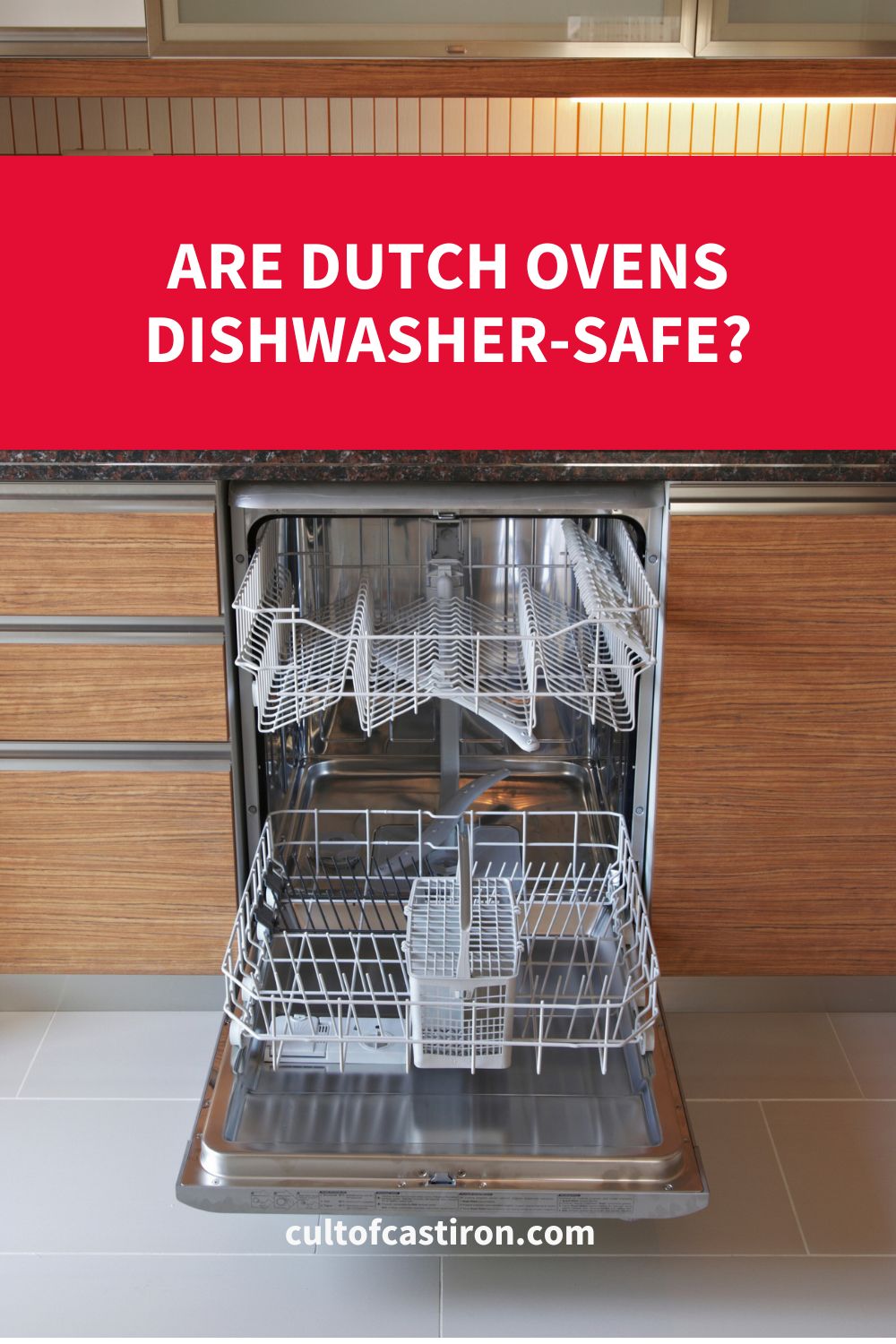There is one hard-and-fast rule when it comes to cast iron cleaning—and no, it’s not about using soap: it’s about not putting your cast iron cookware in the dishwasher.
Dishwashers, or more specifically, dishwashing detergents, are quite harmful to the seasoning of your cast iron pans. Apart from that, the moist environment of dishwashers often induce rusting. This is especially true if you forgot that you placed your cast iron inside, and now it is sitting there, oil-less, and with its seasoning compromised. Trust me when I say that cast iron and dishwashers just don’t mix.
Now, you may be thinking that since enamel-coated cast irons like Dutch ovens don’t need to be seasoned, it follows that they can be placed inside the dishwasher with nary a problem.
Well, not quite.
Read this article to find out why.
Also read: A Complete Guide to Dutch Ovens: Size Chart, FAQs, and More!
Are Dutch Ovens Dishwasher Safe?
First off, it should go without saying that uncoated camp Dutch ovens should not be placed inside the dishwasher, but enamel-coated Dutch ovens are generally considered as dishwasher safe, as many manufacturers claim. But many cast iron users also advise against it as it can wear down the enamel over time, which could increase the chances of it chipping.
The temperature is not the problem. Most Dutch ovens are rated up to 260°C (500°F)—dishwashers can only go so far as 82°C (180°F).
It’s not water either. I mean, it can cause minor surface rusting, but that’s pretty much it.
How about dishwasher salt? Salt is pretty abrasive, right?
Well, as it turns out, dishwasher salt is not actually used in the cleaning process itself as it gets drained out of the unit before the even washing begins.
There’s also not much action involved inside the dishwasher that could cause scratching—it’s just a mechanical arm spraying warm water at a high pressure.
The real problem is the cleaning agents used in a dishwasher: detergent.
Dishwashers don’t use regular dish soaps—they use special detergents which are harsher as they contain bleach and surfactants, which a UW-Madison chemistry lecturer described as a “brute force approach“.
Moreover, many dish detergents contain phosphates, which can “range from slightly to tremendously abrasive” according to FEECO International.
In the short term, it could ruin its aesthetics by making the enamel appear duller. In the long run, it could compromise the constitution of the enamel, which can cause chipping.
Also read: Can Cast Iron Go In The Dishwasher? No – Here’s Why
What Big Dutch Oven Brands Say About The Dishwasher Debate
It’s not just regular Dutch oven users who have mixed opinions on dishwashers.
As it turns out, different Dutch oven brands also have varying guidelines regarding dishwasher use. Here’s a list of the different recommendations of each brand.
Note: Some of these links come from product pages, but rest assured that cultofcastiron.com is not affiliated with any of these brands (nor Amazon, for that matter), and I don’t get any compensation when you buy through these links.
Hand Wash Only
Dishwasher-safe, But Handwashing Recommended
Dishwasher-safe
How to Make Your Dishwasher More Dutch Oven-friendly
But if you’re looking for ways to make sure that your dishwasher won’t damage your Dutch oven (or at least, not as much), then I suggest that you should do the following tips.
Choose phosphate-free detergents
While you can’t do much about the bleach, enzymes, and other substances that are in dishwashing detergents, choosing a phosphate-free detergent can at least reduce the level of abrasion that your Dutch oven will be subjected to.
And guess what, they’re healthier for the environment as well. If you want to quickly filter through potential phosphate-free products, try searching for eco-friendly brands.
Take your Dutch oven out immediately after the cycle is finished
Removing your Dutch oven from the dishwasher immediately after the cycle finishes can help prevent potential damage from rusting due to prolonged exposure to moisture and heat
Once the dishwasher cycle is complete, open the door to let out the steam and cool down the interior. Carefully remove your Dutch oven and dry it thoroughly with a soft cloth or towel. Ensure that all moisture is wiped away, especially around the edges and any crevices, before storing the Dutch oven.
Conclusion
If you’re looking for a personal recommendation, I’d just say that you should wash the damned thing in the sink with soap and sponge and be done with it.
The potential risks to the enamel coating, seasoning, and overall integrity of the Dutch oven far outweigh the convenience of dishwasher cleaning.
By taking proper care, you can ensure your Dutch oven remains a reliable and cherished part of your kitchen arsenal for many years to come.
To learn more about cooking with cast iron, check out Cult of Cast Iron! Scroll through our blog dedicated to all things cast iron and find helpful tips and tricks to level up your cast iron skills! Discover a whole new world of cooking and spread the Cult of Cast Iron word today!

Miguel is a cast iron enthusiast from Cavite, Philippines. He works in the digital marketing field as a content marketing strategist. On the side, he manages a small online bookstore and tends to his plants.

